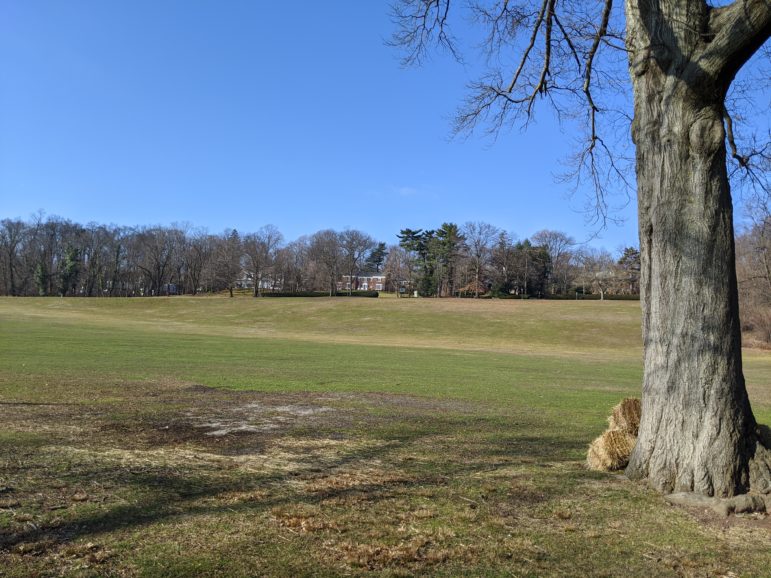
South Orange is testing organic methods for maintaining grass turf on a two-acre field in Floods Hill this year to determine whether it can manage the area’s athletic fields without the use of synthetic fertilizers and pesticides.
But the real challenge to the fields may have less to do with how they are treated and more with how heavily they are used, according to a turf expert at Rutgers University.
“It’s event after event after event,” said Bradley Park, a laboratory researcher at the university’s Center for Turfgrass Science. “While there is a lot of interest in organic turf management, the real limiting factor that’s affecting the performance of the field is it’s too much traffic.”
At the moment, South Orange and Maplewood have a contract with TruGreen that allows for the use of synthetic fertilizers and pesticides as needed to control weeds that can affect field safety and playability.
“The current contract with TruGreen is for treating our athletic field areas that suffer the most wear and tear,” said Peter Travers, deputy director of recreation and cultural affairs for South Orange. He said the test will span two years and is a way to see whether evolving practices in turf management could work here.
“If there is a method that would reduce the use of synthetics, it would be a more natural program, which is something the Environmental Commission is hoping to achieve,” said Travers.
Although synthetic fertilizers and pesticides are applied as needed on a spot basis and in a manner to ensure that the grass is safe for people to use, South Orange resident George Finlay said the safest method is to not apply such chemicals at all.
“It’s not something you want to do if you can avoid it, especially where children play,” said Finlay, who will be leading the effort to test organic methods on the Floods Hill patch at the corner of Meadowbrook Lane and Meadowbrook Place, where the village hosts outdoor movies and concerts in the summer.
Finlay is particularly concerned about chemicals seeping into the area’s water supply through runoff.
“We’re being constantly bombarded with environmental threats, so it’s important to me to keep the ground as clear of pollutants as possible,” he said, adding that several states and Canadian provinces have banned the use of such materials on children’s play areas.
There is also growing interest among residents of New Jersey towns in attempting chemical-free approaches to managing turf, as evidenced by the launch of a one-day course at Rutgers University on organic turf management, which Finlay recently completed.
“The interest in organic food is in part driving this trend, the perception that it’s higher quality,” said Park, who helps teach the course. “I think that thought process has translated over into the turf analysis space.”
Yet Park says that banning synthetic fertilizer outright really limits the ability to manage turf effectively, and that it can be used alongside organic materials without major environmental consequences. The greatest risk, he adds, is not to children but to workers who apply these materials and are exposed to them in large quantity.
“Most of the materials of concern have been removed from the market in the last 20 years,” he said.
According to Park, the larger challenge is for towns to reduce how much they use athletic fields, so that the grass has sufficient time for seeding, sodding and rest. “We are worried about one thing, whereas the bigger problem is that these fields are getting obliterated because they are getting overused,” he said.
That can be easier said than done in towns like South Orange, which have limited athletic fields and multiple sports teams seeking access.
Floods Hill in particular is heavily used, since it is a common sledding destination in the winter, and is thus used year round.
Finlay acknowledges the problem of field overuse in South Orange and Maplewood, and says the solution may be an artificial turf field that allows sports teams to have a space to play in early spring and late fall – when the grass turf is not quite ready for use. Artificial turf comes with its own environmental problems, including the challenge of finding a way to recycle it.
In the meantime, he is assembling the equipment and volunteers needed to run the field test and is optimistic that he will be able to maintain grass that is as lush and green without the use of chemicals. As awareness around environmental concerns grows, Finlay says the time is ripe to make a change in how the area’s turf is managed.
“What we’re seeing is the younger people moving out of the city, they are more aware of this issue. They don’t just hire a landscape service and say, ‘Make my lawn green,’” he said. “They’re much more aware.”
This story was produced in collaboration with the New Jersey Sustainability Reporting Hub project. It was originally reported by Ambreen Ali for VillageGreenNJ.com, and may be re-distributed through the Creative Commons License, with attribution.
